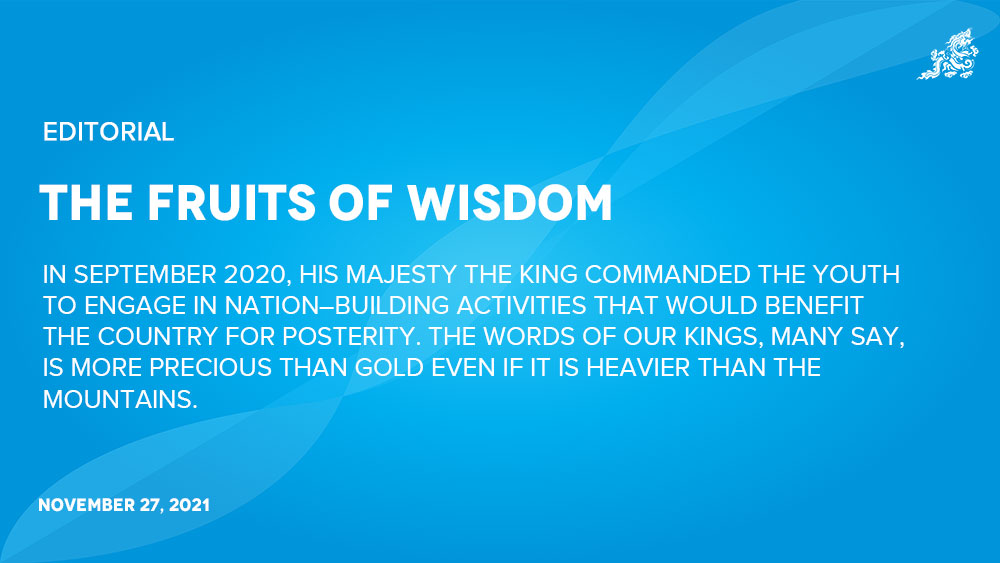In September 2020, His Majesty The King commanded the youth to engage in nation–building activities that would benefit the country for posterity. The words of our Kings, many say, is more precious than gold even if it is heavier than the mountains.
There was wisdom, far more precious than any amount of gold, when His Majesty said the role the youth could play in developing water projects considering the importance of safe and reliable water both for drinking and irrigation. If the wisdom was heavier than the mountains, the young lend their shoulders to bear the weight.
The fruit is there, for all of us to reap.
For decades, since development plans began, water had always been a priority. We had several projects to ensure safe and clean drinking water and water for irrigation to ensure food self-sufficiency. The generation of decision makers today would recall the Rural Water Supply and Sanitation projects with a target to achieve 100 percent water and sanitation by 2000. Unfortunately, after millions of Ngultrums including support from development partners, water still sits on the top of priority list of our plans- both for drinking and irrigation.
Yesterday, the Prime Minister graced the inauguration of the Semjong integrated water supply scheme in Tsirang. The project would ensure drinking and irrigation water to 72 households and bring 210 acres of dry land under cultivation. This is the latest project in just a year.
Since de-suups were engaged in developing water resources and expanding water supply, the young men and women in collaboration with government agencies and the Royal Bhutan Army had ensured water, both for drinking and irrigation, to about 1,426 households in the country. In less than a year, more than 207 kilometres of trenches were developed to ensure water supply to Bhutanese from Haa in the east to Gomdar in the east, from Gasa in the north to Sarpang in the south.
This is a considerable feat given that our past experience in ensuring water for all purposes was a big challenge in water-rich Bhutan.
The wisdom of engaging the youth, especially de-suups in the water project is yet another masterstroke of His Majesty The King. As de-suups connect villages, schools and thromdes to water, many wonder what had happened to all the past projects that cost the government millions of ngultrums.
Water means life. And in Bhutan given our scarce agricultural land, it is imperative in many ways. We need to substitute imports of food products that can be easily grown in the country. Many are leaving for urban areas, abandoning the fields because there is no water to grow food.
Food self-sufficiency is a priority for every elected government, but without water farmers cannot grow food. The pandemic has taught us a good lesson. It has sent a lot of people back to the villages to take up agriculture. Farmers are seeing the potential of agri-businesses. Water, however, is the biggest bottleneck.
A good example is our self-sufficiency in rice. Rice self-sufficiency a decade ago was almost 59 percent. It has dropped to 34.1 percent in 2019. Shortage of water, we can surmise, is one of the biggest contributors to the decline.
Besides ensuring water for drinking and irrigation, the ongoing De-Suung projects have other encouraging features. By giving ownership of water projects to the beneficiaries, sustainability is ensured. When farmers and users are made responsible to operate and manage the water supply schemes, they will be more responsible.
One expectation is Bhutan developing expertise in water management and becoming a centre of excellence. If that is too much a call, we are happy that there are possibilities that with the right wisdom, guidance and aptitude, we can make use of the abundant water resources. The speed and quality of the De-Suung water projects is an evidence.


